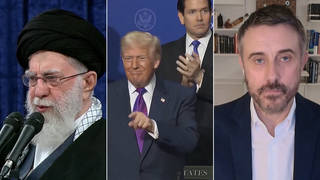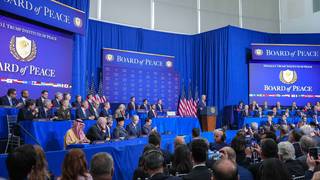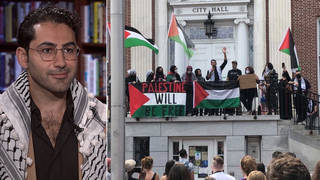
Global condemnation is mounting after Israel bombed Qatar’s capital Doha, attempting to take out senior Hamas leaders who had gathered to consider a U.S. proposal for a Gaza ceasefire. Hamas leadership survived the strike, which killed six. We speak with Jeremy Scahill, co-founder of Drop Site News, who has reported extensively on Gaza ceasefire negotiations and is one of the few Western journalists to be in regular contact with senior members of Hamas. He reacts to Tuesday’s unprecedented strike.
“The very Palestinians who are trying to negotiate some form of a truce with Israel, Israel then targets them and kills them,” says Scahill, who also questions claims by the Trump administration that it was uninvolved in the planning of the bombing. “At the end of the day, Americans should be asking themselves: Is all of this worth the cost, that America is bankrolling this, arming this, supporting this, encouraging this?”
Transcript
AMY GOODMAN: Israel targeted senior Hamas leadership in Qatar yesterday, launching a military strike on Doha. Hamas says its top leaders there were considering a U.S. proposal for a Gaza ceasefire. Though they survived the strike, five lower-ranking members died in the attack. A Qatari security staffer was also killed.
Israeli Prime Minister Benjamin Netanyahu spoke yesterday after the attack.
PRIME MINISTER BENJAMIN NETANYAHU: At noon today, I convened the heads of Israel’s security organizations and authorized a surgical precision strike on the terrorist chiefs of Hamas. These are the same terrorists who planned — terrorist chiefs who planned, launched and celebrated the horrific massacres of October 7th.
AMY GOODMAN: The leaders of Jordan and the United Arab Emirates are reportedly set to arrive in Qatar today. Saudi Arabian Crown Prince Mohammed bin Salman is expected to visit tomorrow.
Meanwhile, the families of the remaining Israeli hostages held in Gaza say they fear for the fate of their loved ones. Einav Zangauker, the mother of Israeli hostage Matan, condemned Netanyahu for the attack on Qatar.
EINAV ZANGAUKER: [translated] I am trembling with fear. I am trembling with fear. It could be that at this very moment Prime Minister Benjamin Netanyahu has essentially sentenced my Matan to death. Anyone who deliberately chooses to endanger my child’s life is murdering him. Why does the prime minister insist on blowing up every small chance for a deal? Why?
AMY GOODMAN: World leaders condemned the strike, including France, Germany, Britain, the European Union. Germany’s chancellor called Israel’s attack on Qatar “unacceptable,” adding, quote, “The war must not spread to the entire region,” unquote. China and Russia have also denounced the attack.
The White House said it warned Qatar just prior to the attack, but Qatar said it only received notice from the U.S. as the capital was being hit by Israeli strikes. On social media, Trump wrote, quote, “I view Qatar as a strong ally and friend of the U.S., and feel very badly about the location of the attack.” Trump spoke yesterday.
PRESIDENT DONALD TRUMP: I’m just — I’m not thrilled about the whole situation. It’s not — not a good situation. But I will say this: We want the hostages back. But we are not thrilled about the way that went down today.
AMY GOODMAN: Qatari Prime Minister Sheikh Mohammed bin Abdulrahman al-Thani said yesterday Qatar’s mediation efforts were central to its identity and that the Israeli attack would not deter its diplomatic role.
PRIME MINISTER SHEIKH MOHAMMED BIN ABDULRAHMAN AL-THANI: [translated] The Israeli attack that took place today on Qatari soil, we cannot call it anything other than state terrorism practiced by someone like Netanyahu in the context of these systematic policies and his ongoing attempts that have destabilized regional security and stability. It’s simply a clear message to the region as a whole.
AMY GOODMAN: For more, we’re joined by Jeremy Scahill, co-founder of Drop Site News. His latest piece is an exclusive, headlined “The 100-Word Ceasefire 'Proposal' Trump Sent Hamas.” Jeremy is a former senior reporter and correspondent at The Intercept.
Jeremy, welcome back to Democracy Now! If you can just first respond to Israel bombing Qatar, trying to take out, assassinate Hamas leadership, which apparently it did not succeed in doing?
JEREMY SCAHILL: Well, first of all, Amy, let’s remember that Qatar houses U.S. Central Command and is part of this security umbrella that Donald Trump spoke about, including recently, when he made his trip around these Gulf countries. So, the idea that the United States was just informed of this at the last minute — you know, Trump said, oh, the U.S. military informed him, and then he scrambled to try to let Qatar know, and he said, “Oh, my special envoy, Steve Witkoff, I told him to call Qatar, but, oops, he did it too late, and the bombing had already happened” — that’s not a believable narrative at all. And, in fact, what we’ve seen over the past couple of weeks is Donald Trump making very thinly veiled threats against the Hamas leadership, directly mentioning them and saying that nasty things are going to happen to them if they don’t accept his ultimatum, which essentially boiled down to a surrender agreement where Hamas was being asked to hand over all of the Israeli captives. There are roughly 20 of them believed to be still alive, and then another 30 or so who are deceased. And Trump has been saying that some nasty things are going to happen to the Hamas leadership if they don’t do this.
But I think it’s important to back up, because the context of the lead-up to this over the past year is almost never mentioned in Western media. It’s as though history begins each time the U.S. or Israel make an ultimatum, and those ultimatums are aimed at trying to blame Hamas for a continuation of this war of extermination against the Palestinians.
Last summer, in July of 2024, the United States was engaged in negotiations with Hamas. Hamas, on July 2nd, accepted a ceasefire deal. This is in 2024, the summer of 2024, that they were told that the United States had signed off on, and that if Hamas agreed to certain amendments, that Israel was going to be on board. And in the midst of those discussions, Israel assassinated Ismail Haniyeh, who was actually the last democratically elected prime minister of Palestine, not just of Gaza. And he was Hamas’s political leader and its chief negotiator, and they assassinated him.
And then nothing happened with the ceasefire, until Donald Trump was running for election, and he and Joe Biden then endorsed a ceasefire that, by all accounts, Trump sort of pushed through with Netanyahu, that went into effect in January. Israel blew up that deal on March 2nd, unilaterally exited it, imposed a full-spectrum siege on Gaza, barring any food, medicine or other life essentials from entering the Gaza Strip. On March 18th, it then resumed its genocidal campaign of terror bombings against Gaza, that have endured to this moment.
Then, a couple of months ago, Steve Witkoff, the special envoy, and Benjamin Netanyahu said that Hamas must accept what they called the Witkoff framework, which was a 13-point plan for a two-month ceasefire, during which half of the living Israeli captives would have been released, and there would have been negotiations on ending the war. It was a very difficult framework for Hamas, because it came very close to crossing some of the red lines that Hamas had defined, that it felt that if it agreed to these terms, it would effectively amount to a surrender of the Palestinian cause of liberation. But on August 18th, just over three weeks ago, Hamas formally agreed to what mediators said was 98% of the terms that had been demanded by Netanyahu and Trump. Israel did not respond to that in any formal way. Trump and Israel then escalated their threats against Hamas, after they accepted it.
And, Amy, by the way, Hamas made unprecedented concessions, concessions that include not demanding a clear timeline for the withdrawal of Israeli forces from the Philadelphi Corridor in southern Gaza. That was a huge deal for Hamas. They reduced the number of Palestinian captives held by Israel that would be released in a deal. They dropped their demand that the Gaza Humanitarian Foundation, this scheme run by the United States and Israel — some 2,000 Palestinians have died seeking aid since the GHF went into effect. Hamas dropped its demand that the GHF be expelled from Gaza as part of a peace deal. And it was willing to accept a full-circle buffer zone totally around the Gaza Strip that would be controlled by Israel and at points would pierce 1,500 meters deeper into Gaza. So, Hamas made these concessions, and then they waited.
And the response from Netanyahu was to announce a “final solution” plan for Gaza City, and they began ratcheting up the terror bombings. They continued to burn children alive in tents. And then they started bombing massive residential apartment towers in Gaza, some of which housed hundreds of Palestinian families. All of this happened, Amy, after Hamas had accepted a proposal filled with concessions, that the mediators said was 98% of the demands from Netanyahu and Trump.
And then, last week, the United States began some back-channel discussions with Hamas, and they said, “Listen, Donald Trump wants to end this war. He has some ideas.” And Trump’s idea, I was told by senior Hamas officials, was that, as a initial gesture, Hamas would release all of the Israeli captives, living and dead, and then Trump would see if he could do something about restarting negotiations to try to end the war.
Well, Hamas responded to this in a remarkably diplomatic way. They said they’re open to any proposals, either a comprehensive deal, where all captives would be released at once, at the beginning of a deal, if there were proper international guarantees and a guarantee that Israel would stop the genocide and withdraw, or they were open to returning to the original framework that they agreed to, which was packed full of concessions.
So, Trump then submits — and we obtained it — a 100-word summary. And it says, within 48 hours, all the Israelis have to be released in exchange for some Palestinians. It says that Israeli withdrawal will be contingent upon a new government acceptable to Israel being imposed on Gaza and that Israel will maintain full security control of the Gaza Strip. It says that aid will be allowed in, but it doesn’t say who will allow the aid in or how much aid would be allowed in. And it says that Trump will guarantee for 60 days that a ceasefire will hold, as long as negotiations are continuing. Now, this violates so many of Hamas’s red lines, but their response to Trump was, “We’re open to any deal.” And I’m told by sources from within Hamas that part of what they were meeting to discuss at the time of this bombing was the idea of posing to Trump a series of questions and clarifications, because a 100-word document does not form a ceasefire agreement when you’re facing down a genocide.
And so, the basic fact is this: Three weeks ago, they agreed to concessions. Everyone ignored it. Trump then issues a new ultimatum in the form of a 100-word document. They’re meeting to discuss it, and then Israel bombs the Hamas offices in a sovereign nation, Qatar, that houses U.S. Central Command. No air defense systems were activated. The United States security umbrella was nowhere to be found. And then Trump concocts this story about how he — how Steve Witkoff was just a little bit too late in informing Qatar that this happened.
So, what we see here is part of a long pattern of Israel assassinating the very people, or attempting to assassinate the very people, that the president of the United States claims he wants to negotiate with. They tried to kill the very people that would have been sitting across the table in these negotiations.
JUAN GONZÁLEZ: Jeremy, I wanted to ask you — the Qatari prime minister, Sheikh Mohammed bin Abdulrahman, said — he was quoted as saying, quote, “We have reached a decisive moment where there must be a response from the entire region to such barbaric actions.” Is it your sense that the other Arab nations in the region — what can they do, or what do you think they would be willing to do, in response to this attack?
JEREMY SCAHILL: Remember, Juan, that in Trump’s first term, he made a big deal about the so-called Abraham Accords. And, you know, the first country and the primary country to accept it was the United Arab Emirates, which many people in the Arab world, and certainly Palestinians, view as, essentially, a self-declared suburb of Israel for all practical purposes on this issue. And we’ve watched as Netanyahu has expanded these wars — Gaza, the West Bank, Syria, Lebanon, Yemen, Iran, now Qatar — and they’ve done nothing. There’s been no response other than strongly worded statements from any Arab country.
And so, while they’re all saying now, “Oh, now the threshold has been crossed,” what are they going to do? Are they going to militarily strike Israel? We’ve watched Palestinians burned alive for two years, and not a single Arab country, except Yemen, has stood up to do anything about it or taken any risks. And almost the entire Yemeni Cabinet was assassinated recently by Israel, because of the fact that they were the only ones in the world, in addition to Iran, in terms of nation-states, that stood up to them.
So, you know, anything short of these Arab countries saying this is a genocidal regime that is operating with impunity, backed by the United States — anything short of a military confrontation is worthless. Israel doesn’t care anymore about these normalization agreements. You know why? Because they have shown the entire world that they can do whatever they want, and no country is going to stand up to them. They have the huge world bully behind them in the form of the United States. They are a nuclear-armed power. They’re running a scorched-earth bombing campaign, and they’re trying to wipe the Palestinians off the map.
So, you know, I hope I’m wrong. I hope that we see some kind of confrontation of this genocidal serial killer masquerading as a nation-state, that is modern Israel. But I doubt it, because history shows that they are just sitting on their hands and saying, “Oh, here’s a strongly worded statement.”
JUAN GONZÁLEZ: And you’ve mentioned the history of the past couple of years in terms of Israel attempting to kill Palestinian leaders, but this is a decadeslong policy of constantly trying to decapitate the leadership of Palestinian resistance. And you would think, by this time, the Israelis would recognize that this policy doesn’t work, because it only helps to foment more resistance among the people.
JEREMY SCAHILL: I mean, it is absolutely clear from 76 years of history and looking at what I think can objectively be called the steadfastness of the Palestinian people, that you can kill the leaders, you can’t kill the ideas. You can’t kill the struggle. So, if there isn’t a Hamas, if somehow Hamas ceases to exist as a political entity and a resistance movement, other Palestinians are going to pick up the mantle and run with it.
And one of the reasons why Hamas negotiators — and, by the way, it’s not just Hamas. Many Palestinian factions are now involved with these negotiations, including some that are critical of Hamas or some that don’t even have armed wings. They all are unified in saying, “We will not give up our right to bear arms.” They cite international conventions and basic ethics and morality, that an occupied people have a right to resist.
But if you actually embrace the idea that Israel functions as an industrial-scale serial killer hunting Palestinians, then you understand that they want to kill any Palestinian that is capable of standing up and describing the Palestinian liberation cause to the world. In 1972, they used a car bomb to kill Ghassan Kanafani, one of the most famous Palestinian literary figures and poets, who was a leader and spokesperson of a political liberation movement at the time. They killed the quadriplegic spiritual leader of Hamas, Sheikh Ahmed Yassin, in a drone strike in 2004. They killed al-Rantisi, another one of the Hamas founders, in a bombing in Gaza. They killed Ismail Haniyeh last summer in Iran. They try to systematically kill Palestinians.
And they also — there’s a subsection of this, Juan, which is that the very Palestinians who are trying to negotiate some form of a truce with Israel, Israel then targets them and kills them. The second-in-command of the Qassam Brigades, Hamas’s armed wing, Ahmed Jabari, was killed in 2012 as he was in the middle of trying to broker some form of a ceasefire or long-term truce with Israel.
And so, what we’re seeing now in the bombing of the Hamas office in Qatar, where they killed — you know, people are saying, “Oh, they’re low-ranking members.” Secretaries were killed, young people who were drivers or bag carriers for certain Hamas figures. That’s who was killed in this strike, that happened in a country that houses CENTCOM, that Donald Trump recently said falls under the security umbrella of the United States.
At the end of the day, Americans should be asking themselves: Is all of this worth the cost, that America is bankrolling this, arming this, supporting this, encouraging this, serious questions about U.S. involvement in this strike itself? Because that entire region is going to be set on fire very quickly. And I guarantee you, there’s a lot of nervousness in the capitals of those Gulf countries and in Arab countries in general, because the population of those countries see, in plain sight, that their leaders are doing nothing, and at times even collaborating with the U.S. and Israel. So, this is an incendiary moment that is rooted in a 76-year history of a U.S.-enforced war of annihilation being waged by Israel against the Palestinian people.
AMY GOODMAN: Jeremy, I wanted to get your reaction to Matt Duss of the Center for International Policy, former foreign policy adviser to Bernie Sanders, who told The Guardian, “This is an attack on the capital of a major non-NATO U.S. ally in the midst of U.S.-supported negotiations — against officials who were originally hosted there at the United States’ request. It’s an attack on diplomacy itself.” Of course, Qatar says they’re going to continue to be a mediator. The significance of, as you write, the 100-word ceasefire that Trump put forward and the idea — and this happened before also — that as they gather to consider what the U.S. sent, Israel tries to blow them up, what this means for the future of diplomacy, as world leaders, from the Gulf to Europe, condemn what has just taken place? And also, by the way, how much of this do you think is motivated by Netanyahu, the prime minister, being on trial for corruption, and as these things happen, it takes him out of the trial?
JEREMY SCAHILL: Well, you know, to take on the first part of it, let’s remember that — the recent track record, that is out in the open, of Donald Trump. The United States claimed to be in good-faith negotiations with Iran over its nuclear program and trying to reset the U.S.-Iranian relationship. And Trump then openly declared that this was effectively a covert operation, a cover operation, to catch the Iranians off guard, and the United States and the Israelis then did sustained bombing for 12 days against Iran. Trump came out and basically said we lied about being engaged in negotiations. So, that fact alone, out in the open, means that we have to question what potential role the U.S. played in this strike, when you take that and combine it with the threats that Trump was increasingly aiming at Hamas’s leaders, when you take that in conjunction with the fact that the chief of staff of the Israeli army said just over a week ago that they’re going to start assassinating political leaders, and that Israeli media reported that Donald Trump himself had made clear to Hamas’s political leadership that assassination of them was on the table by Israel if they didn’t capitulate to his ultimatum.
So, you know, the idea of diplomacy, there is no diplomacy in these cases with Donald Trump. He uses something that should be a very sacred process, because it requires trust on both sides, and he’s used it in a covert operation to bomb Iran. And now he has allowed — and I say “allowed,” because the United States could have easily shot down those munitions from Israel, from the capacity that it has placed in Qatar — to allow this kind of attack to happen in the borders of a country that the U.S. itself asked to host Hamas negotiators so that they could have this process means that the U.S. can’t be trusted at all. Now, most people wouldn’t trust the U.S. in general, who know history. But even on the issue of we’re engaging in negotiations, it’s now used as a covert operation.
Now, as to the second part of it, with Netanyahu’s domestic political situation, yes, Netanyahu is facing trouble. But if you actually look at the political reality, more than 80% of Israelis right now, in recent public polls — Jewish Israelis, that is — support the program in Gaza. And, you know, for all of the talk of Netanyahu’s coalition being in trouble if Ben-Gvir goes or if Smotrich goes, I think that there’s quite a bit of exaggeration and distraction at play, thinking that Netanyahu is primarily motivated by getting rid of these political scandals. He’s at the zenith of his bloody career. He believes that he has to get done as much as he can while Donald Trump is in power. And that’s why I think we’re seeing also increasing moves toward trying to fully annex the West Bank — Smotrich, who, for all practical purposes, is in charge of the West Bank right now, implying that they may seek to deport a half a million or more Palestinians, claiming that they’re actually really Jordanians and that they need to go back to Jordan. They’ve severed the West Bank in half. They’re in the midst of the largest forced displacement campaign since 1967. Netanyahu is trying to run the deck right now, and I think he’s not as concerned about his domestic political situation as he is as impacting or implementing his genocidal agenda while he has the most favorable possible administration in power in the U.S.











Media Options